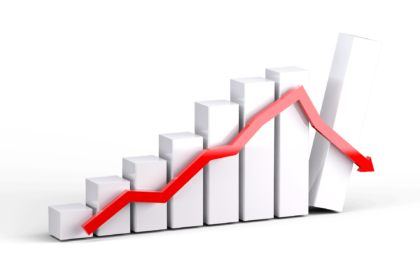
As any experienced investor knows, market volatility is a normal part of the investment landscape. However, recent years have seen unprecedented market volatility, with sharp swings in both directions. This has profoundly impacted venture capitalists, who are now more cautious than ever before.
In the past, VCs often rode out market downturns by investing in companies with solid fundamentals that were relatively insulated from economic cycles. However, the last few years have been different. We’ve seen several companies that raised significant amounts of capital during the good times go belly up during the downturns. This has made VCs much more cautious about investing in companies that may be exposed to market volatility.
As a result, we’re likely to see a slowdown in VC activity in the coming years. This doesn’t mean that there will be no money available for startups; there will still be plenty of long-term investors willing to bet on innovation. However, it does mean that startups must be more mindful of market cycles and plan their operations accordingly. Considering these insights before moving forward in this transitioning economic climate, you’ll be well-positioned to take advantage of the next market upturn.
The Turn of the Tide: Venture Capital in a Downturn
The last decade has been very good to venture capitalists. That may be about to change. As the U.S. economy slows and the yield curve inverted, some are starting to worry that a downturn is on the horizon. That could have a significant impact on the flow of venture capital.
In good times, venture capitalists can raise money relatively easily. They can also count on solid exits through initial public offerings (IPOs) or acquisitions. But in a downturn, things can get much more challenging. IPOs dry up, and investments become harder to come by. That can quickly turn off the tap of capital from limited partners (LPs), the institutional investors who provide most of the funding for VCs.
What History Tells Us
History repeats itself, and this is especially true regarding the economy. Over the past century, there have been numerous periods of recession and depression, each with its unique cause and effect. However, there are also many commonalities between these downturns. For example, most recessions are caused by a combination of factors, such as an increase in interest rates, a decrease in consumer spending, and a decrease in business investment.
Additionally, most recessions tend to be relatively short-lived, lasting only a few months or a year. However, they can often have long-lasting effects, such as job losses and decreases in home values.
As we enter another period of economic uncertainty, we must remember what history tells us about previous downturns. By understanding the causes and effects of these periods of recession, we can better prepare for and weather the storm.
To understand how a downturn might affect investments, it’s helpful to look at what happened during the last two major economic contractions—the dot-com crash of 2000-2002 and the financial crisis of 2007-2009. After both of those downturns, there was a significant slowdown in venture capital activity. Funding fell sharply and then took several years to recover.

A Look Back at Previous Downturns
While a bear market can be a scary time for anyone with skin in the game, it’s important to remember that downturns are a natural and essential part of the market cycle. And, as any seasoned investor knows, there is more than one way to profit from a bear market. Let’s look at some evolving trends in venture capital that can help investors weather future storms.
The Crash of 1929 and the Great Depression
The most infamous bear market in U.S. history was undoubtedly the Crash of 1929 and the resulting Great Depression. The crash was precipitated by several years of runaway speculation in the stock market, which had reached dizzying heights by September 1929.
When liquidity dried up, and panic selling began, the Dow Jones Industrial Average (DJIA) plunged more than 22% in just two days—setting off a cascading effect that wiped out billions of dollars in paper wealth and fell the country into a prolonged period of economic hardship. It would take until 1954 for the DJIA to fully recover its losses.
The Stagflationary 1970s
While the U.S. economy staged a strong recovery in the postwar years, by the early 1970s, it had begun to slow down again. This time, however, inflationary pressures were also mounting, creating a period of “stagflation”—a term used to describe periods of high inflation and low economic growth (or even contraction).
The stock market responded accordingly, with two distinct bear markets: one from 1966 to 1974 and another from 1973 to 1974. This led to soaring unemployment and a sharp increase in the cost of living. The stock market was also severely affected. The Dow Jones Industrial Average (DJIA) fell by 53% from its peak in 1973 to its low in 1974. This was a significant blow to investors, who saw their portfolios lose great value.
The index experienced sharp swings as investors reacted to the changing economic conditions. Inflationary pressures led to a decline in the value of stocks, while poor economic growth meant that companies were less profitable. The good news for investors is that both bear markets eventually ended, setting the stage for an extended bull run in stocks that would last well into the 1980s.
The Dotcom Bust
Investors who came of age in the 1990s will no doubt remember the Dot-com Bust—a tech-driven market crash that saw the Nasdaq Composite Index plunge more than 78% from its all-time high in 2000 to 2002 lows. While not on par with previous bear markets in terms of magnitude or duration, the dot-com crash was notable for how abruptly it took place and how widespread investors felt its effects across different asset classes (not just tech stocks). In fact, many investors whose tech stocks had burned during this period remain wary of investing in technology companies to this day.
The Covid Flash Crash of 2020
The Covid-19 pandemic has been unlike any other event in recent history in terms of its global reach and the speed with which it upended economies worldwide. In the U.S., the stock market responded with a sharp sell-off that began in late February and reached its nadir in mid-March.
The Covid flash crash was a sudden drop in stock prices in the late afternoon of February 28, 2020. The Dow industrials fell by 12.9%, the second biggest percentage loss post-WWII. The S&P 500 and the Nasdaq Composite Index both dropped by 12%. This was the most considerable percentage loss ever for the Nasdaq. The S&P 500 would not bottom out until March 23, a week later. From February 19, 2020, high to the March 23 bottom, the S&P would decline by about 34%. Then, almost as quickly as it had fallen, the market reversed. By August, the S&P was back to its old highs.
The sell-off was sparked by concerns over the coronavirus pandemic, which had caused major global economic disruptions. The flash crash marked the worst day for stocks since the start of the year, and it shocked many investors who had been bullish on the market. Although the market has recovered since the flash crash served as a reminder of the potential risks that still exist in the market.

What can we learn from these previous downturns?
As we face the looming economic downturn, it’s natural to look to history for guidance. After all, previous generations have faced similar challenges and come out the other side. So, what can we learn from their experiences?
Buy Low, Sell High
Another important lesson that we can learn from past downturns is that they provide opportunities for investors to buy stocks at a discount. For example, during the Dotcom Bubble of 2000, many tech stocks were trading at sky-high valuations. Some were even trading at over 100 times their earnings! These valuations were not sustainable, and the bubble eventually burst. However, those investors who were patient and waited for prices to come back down to earth could buy these stocks at a considerable discount.
Similarly, during the 2008 financial crisis, many banks and other financial institutions were trading at bargain-bin prices. Of course, these companies were in danger of going bankrupt, so investors were at risk of investing in them. However, for investors willing to take on that risk, the market rewarded them with huge returns as these companies eventually bounced back.
Some Sectors Perform Better Than Others During Downturns
Finally, we can learn from past recessions that some sectors outperform during downturn periods while others lag. For example, defensive sectors like healthcare and consumer staples tend to do relatively well during recessions as people continue to need these products and services even when times are tough. On the other hand, cyclical sectors like energy and industry tend to underperform as demand decreases during challenging economic periods.
Of course, every recession is different, so there is no guarantee that any one sector will outperform during a given downturn period. However, this trend provides clues as to which sectors might be worth investing in during a recession.
How Downturns Impact Venture Capitalists
VCs are not immune from the effects of an economic slowdown either. In fact, they may be even more vulnerable than other investors because their business model relies heavily on fundraising and exits—both of which can be quite difficult during a downturn.
As LPs become more risk-averse, they may start pulling back on their commitments to VC funds or demanding that managers return leftover cash so that it can be invested elsewhere. That can put much pressure on VC firms, which usually have high overhead costs and limited sources of revenue outside of capital calls and carried interest (the share of profits that VCs receive).
What This Means for Startups
So, what does all this mean for startups? Firstly, it’s important to remember that there will still be plenty of opportunities for companies with solid fundamentals and attractive valuations regardless of what happens in the larger economy. However, fundraising is likely to become more complicated and competitive as VCs become more selective with their investments.
Downturns can have a significant impact on venture capitalists and startups alike. In good times, VCs can quickly raise money and count on strong exits through IPOs or acquisitions. But in a downturn, those things become much tougher—VC funding falls sharply, and it can take years to recover. So, what does all this mean for startups?
Firstly, it’s important to remember that there will still be plenty of opportunities for companies with firm fundamentals and attractive valuations regardless of what happens in the larger economy. However, fundraising is likely to become more complex as VCs become more selective with their investments during an economic slowdown.
Striking a Balance Between Risk and Reward
While there is no surefire way to avoid losses during a bear market, understanding past downturns can give investors some insight into weathering future storms—and even profit from them. One trend that has emerged in recent years is an increased appetite among venture capitalists for investments in so-called “unicorn” startups (private companies with valuations exceeding $1 billion).
That said, these sorts of investments can be riskier than traditional venture capital bets. They have also proven to be more resilient during periods of economic turmoil. For example, while publicly traded tech stocks suffered significant losses during the dot-com crash, many privately held tech companies continued to thrive—a fact that helped VC firms avoid some of the worst losses experienced by other types of investors.
Ultimately, while no guarantee that investing in unicorns will protect your portfolio from losses during a bear market, it’s worth keeping an eye on this evolving trend as we head into what could be a period of renewed economic uncertainty.

M Accelerator
M Accelerator offers continued support to its members, including these articles with data and insights on fundraising, business development, and go-to-market strategies.
Check out our programs to see if you’re interested in applying today!



